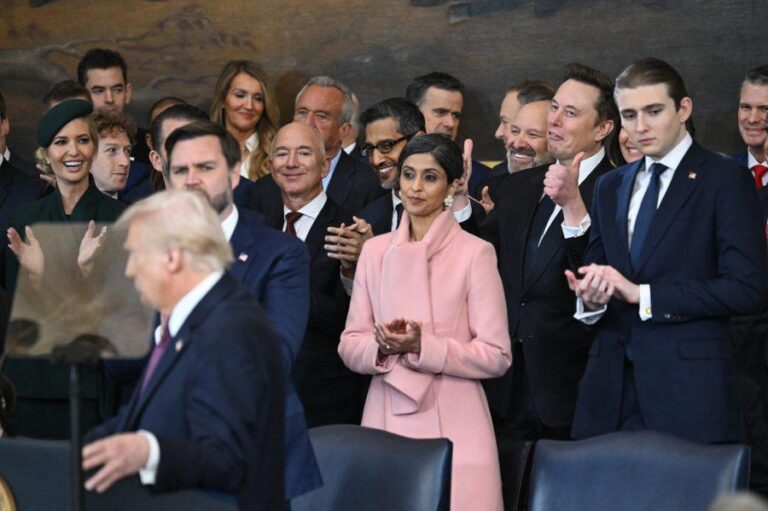In recent years, growing concerns have emerged over the outsized influence of wealthy individuals in American politics. A new analysis from the Brookings Institution delves into this contentious issue, examining whether the country’s richest elites are increasingly shaping policy decisions and electoral outcomes. As campaign financing, lobbying, and political donations reach staggering heights, questions about the balance of power and democratic representation are prompting renewed debate across the nation. This article explores the findings from Brookings and considers the implications for the future of American governance.
The Growing Influence of Wealthy Donors on Political Campaigns
In recent years, the financial imprint left by ultra-wealthy donors on political campaigns has become unmistakably visible. These backers ‚ÄĒ often billionaires and industry magnates ‚ÄĒ possess the resources to fund advertising blitzes, sway primary races, and even effectively bankroll entire campaigns. Their contributions extend beyond mere funding, influencing policy priorities and candidate platforms as politicians increasingly tailor their messages to appeal to these influential benefactors. This dynamic raises important questions about the balance of power and representation in a democratic system. Notably, the influx of “dark money” through super PACs and nonprofit organizations further complicates transparency efforts, allowing substantial sums to flow without clear attribution.
Key factors illustrating this growing influence include:
- Heightened spending in swing states driven by wealthy donors targeting key electoral battlegrounds.
- Strategic funding of grassroots movements to build public support aligned with donor interests.
- The increasing role of coordinated donor networks that pool resources for maximal impact.
| Campaign Year | Total Wealthy Donor Contributions | Percentage of Total Funds |
|---|---|---|
| 2012 | $580 million | 15% |
| 2016 | $1.2 billion | 27% |
| 2020 | $2.1 billion | 35% |
How Economic Elites Shape Policy Agendas and Legislation
Economic elites wield significant power in shaping policy agendas due to their access to resources and strategic networks. With extensive campaign contributions, lobbyist connections, and control over media narratives, they are often positioned to influence legislative priorities in ways that align with their interests. This influence manifests not only in direct policy formulation but also in setting the terms of debate, effectively marginalizing alternative viewpoints and public concerns. The result is a policy environment where economic inequalities are seldom addressed, while regulations beneficial to the wealthy receive prioritized attention.
Several mechanisms enable this dominance, including:
- Lobbying expenditures: Billions spent annually to sway legislators
- Think tank funding: Financing research that supports elite-favored policies
- Revolving door practices: Movement between corporate roles and government posts
| Influence Channel | Estimated Annual Spending | Policy Impact |
|---|---|---|
| Lobbying | $3.5 billion | Corporate tax breaks |
| Think Tanks | $500 million | Market deregulation |
| Super PACs | $1.2 billion | Election outcomes |
The Impact of Super PACs and Dark Money on Electoral Outcomes
Super PACs and dark money groups have increasingly shaped the contours of American elections, wielding influence that often eclipses traditional campaign contributions. Unlike regular political action committees, Super PACs can raise and spend unlimited sums from corporations, unions, and individuals, provided they do not coordinate directly with candidates. This freedom has led to a surge in highly funded advertising campaigns, rapidly altering electoral dynamics by amplifying voices with deep pockets. Dark money organizations compound the issue by masking their donors, leaving voters in the dark about who is financing political messaging, making accountability a major concern.
Data shows that in competitive races, candidates supported by substantial Super PAC spending outperform their opponents by considerable margins, emphasizing an uneven playing field. The table below illustrates a snapshot from the 2022 midterm elections, highlighting how high Super PAC spending correlates with success rates for candidates.
| Spending Level | Success Rate | Average Expenditure ($ millions) |
|---|---|---|
| High Super PAC Support | 68% | 12.5 |
| Low/No Super PAC Support | 32% | 1.9 |
- Opaque funding erodes public trust and challenges the transparency of the democratic process.
- Wealth concentration enables a narrow faction of donors to dominate political discourse.
- Regulatory loopholes have allowed these practices to flourish with minimal restrictions.
Strategies to Increase Transparency and Limit Wealth-Driven Political Power
Enhancing transparency in political financing is a critical step toward curbing the outsized influence of wealth in American politics. Policymakers can introduce stringent disclosure requirements that mandate real-time reporting of donations, ensuring the public stays informed about who funds political campaigns and lobbying efforts. Additionally, implementing robust auditing and enforcement mechanisms can deter illicit financial flows and super PAC spending that often escape scrutiny. Transparency tools such as publicly accessible databases and advanced analytics can empower journalists and watchdog groups to track the flow of money more effectively.
Limiting the disproportionate impact of affluent donors also calls for structural reforms. Introducing caps on individual and corporate contributions to political entities can level the playing field, while providing public financing options for candidates fosters competitive elections based on ideas rather than bank accounts. Here are some promising approaches gaining traction:
- Establishing matching funds programs to amplify small-dollar donations
- Reforming lobbying rules to limit revolving door practices
- Strengthening enforcement of existing campaign finance laws
- Expanding the definition of political spending to include issue advocacy
| Strategy | Purpose | Impact |
|---|---|---|
| Real-time Donation Disclosure | Increase Public Transparency | Reduces Dark Money Influence |
| Contribution Limits | Restrict Wealthy Donor Power | Promotes Electoral Fairness |
| Public Financing | Support Grassroots Campaigns | Enhances Candidate Diversity |
In Conclusion
As the influence of wealth in American politics continues to spark debate, the Brookings analysis underscores the complexities behind the rising power of the ultra-rich. While their financial resources undeniably amplify their voices, the broader implications for democracy and policy-making remain a contentious issue. Understanding these dynamics is crucial as the nation grapples with questions about representation, equity, and the future of its political system. The ongoing dialogue invites policymakers, scholars, and citizens alike to scrutinize the role of money in shaping America’s political landscape and consider pathways to ensure a more inclusive and balanced democracy.




